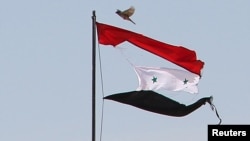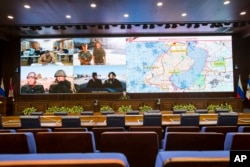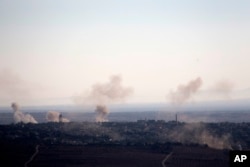The U.S.-Russia sponsored cease-fire in the Syrian war may allow the U.S. and its coalition partners, as well as Russia and the Syrian regime, to concentrate on ridding the country of the Islamic State.
The possibilities depend on how the cease-fire holds, analysts say. And it’s unlikely the various military units will work in concert – though Washington and Moscow said there will be some joint efforts.
“The cease-fire gives a chance for the Russians and Americans to coordinate more effectively in their separate wars on IS,” said Radwan Badini, a professor at Salahaddin University in Irbil, Iraq.
Purging IS is the one thing the various parties in Syria’s conflict agree on, Badini said. IS fighters are scattered in Syria with IS maintaining a stronghold in its de-facto capital, Raqqa.
The cease-fire is being viewed with skepticism since previous attempts have faltered, but it “would probably free up some forces on [Syrian President Bashar al-] Assad's side for other tasks” like battling IS, said Aron Lund, a Middle East analyst with the Carnegie Endowment for International Peace, a Washington-based think-tank.
The cease-fire formally went into effect Monday with Russia announcing a halt to its aerial campaign in Syria, excluding “terrorist-controlled” areas.
If the truce holds, regime troops will attempt to battle IS in “important areas like the Aleppo countryside and the region east of Homs,” said Syria analyst Faysal Itani of the Atlantic Council in Washington.
Government forces and IS fighters have also been battling in the oil-rich eastern province of Deir Ezzor, where IS controls much of the countryside.
“Any resources and manpower accruing to the [Assad] regime will also be deployed in Deir Ezzor,” Itani told VOA.
With major defeats from Turkey-backed rebels and U.S.-backed Kurdish forces in northern Syria, IS fighters have been looking for new areas of control.
Since last week, IS has been trying to hold territory in a rebel-held area in the Damascus countryside. The Mount Qalamoun region is strategically important for both rebels and government forces.
“If we accept the assumption that the cease-fire will hold, more rebel fighters will be willing and available to fight IS in Aleppo province and perhaps Raqqa as well,” analyst Lund told VOA.
U.S. and Turkish officials recently discussed the role local forces could play in liberating Raqqa, IS’s self-proclaimed capital in Syria.
Turkey backs some rebel factions who played a major role in ridding IS fighters from the border town of Jarablus, while the United States has been supporting a Kurdish-led coalition that has made significant gains against IS in north and eastern Syria.
“At this point, IS represents a threat for both Syrian government and rebel forces,” said Badini of Salahaddin University. “So an effective cease-fire means that both sides would be more encouraged fighting them [IS], instead of fighting each other.”
Analysts predict that if IS crumbles, a solution to Syria’s complex civil war could evolve.
That scenario would give “more power to certain players and [help] forge new alliances, as we've already seen with the Americans and the Kurds, and the growing cooperation between Washington and Moscow,” Lund said.






